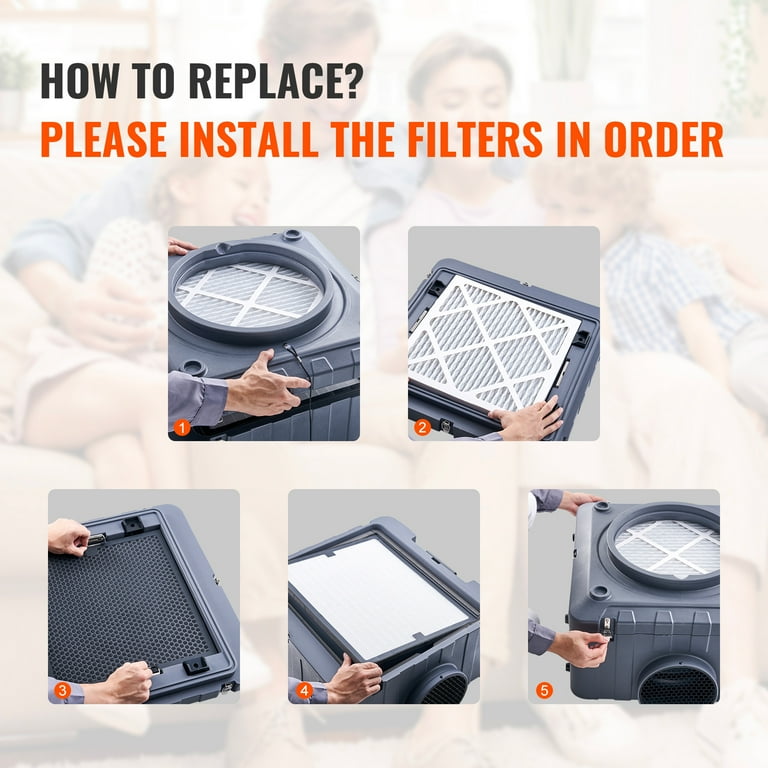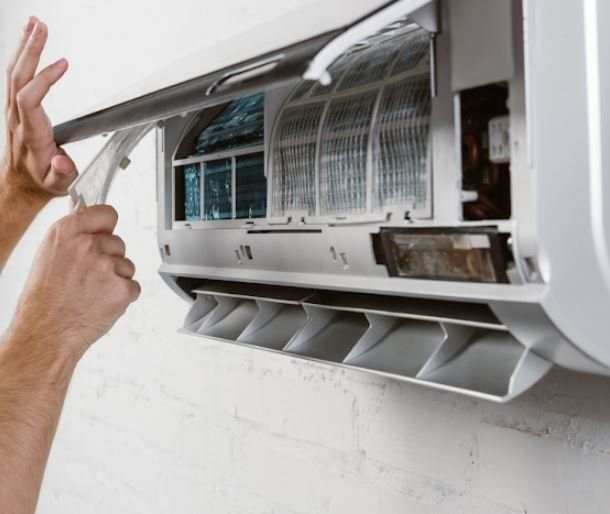Can you repair a damaged HEPA filter? The short answer is no.
Damaged HEPA filters can’t be fixed effectively. They need to be replaced. HEPA filters play a crucial role in maintaining clean indoor air. They trap tiny particles, ensuring you breathe healthier air. But once damaged, their efficiency drops significantly. Attempting to repair them compromises their integrity.
Replacing a damaged HEPA filter is the only way to ensure it works properly. In this blog, we’ll explore why repairing isn’t an option, the importance of HEPA filters, and the best practices for maintaining them. Understanding these aspects helps you keep your indoor air quality at its best.
Introduction To Hepa Filters
Introduction to HEPA Filters: HEPA filters are crucial for maintaining clean air. They are found in many household and industrial devices. Understanding their function is key to knowing if you can repair a damaged one.
What Are Hepa Filters?
HEPA filters stand for High-Efficiency Particulate Air filters. They remove at least 99.97% of airborne particles. These particles are as small as 0.3 microns.
HEPA filters are made of a mat of randomly arranged fibers. The fibers are usually composed of fiberglass. The thickness of the filter and the diameter of the fibers affect its efficiency.
Common Uses Of Hepa Filters
HEPA filters are used in various settings. Here are some common uses:
- Air Purifiers: They help clean indoor air by trapping pollutants.
- Vacuum Cleaners: They prevent dust and allergens from escaping back into the air.
- Medical Facilities: They maintain sterile environments by filtering bacteria and viruses.
- Automobiles: They ensure clean air inside the cabin of vehicles.
Knowing these uses can help you understand the importance of a HEPA filter. If damaged, the device may not function properly.

Credit: www.walmart.com
Signs Of A Damaged Hepa Filter
HEPA filters are essential for maintaining clean air in your home or office. They capture particles and allergens, improving air quality. Over time, these filters can get damaged. Recognizing signs of a damaged HEPA filter is crucial for ensuring it works effectively. Below are key indicators of a compromised HEPA filter.
Visual Inspection
Start with a visual inspection. Look for any visible damage.
- Tears or Holes: Even small tears can reduce efficiency.
- Discoloration: A filter that appears dark or stained may be clogged.
- Warped Shape: A bent or misshaped filter won’t fit properly.
Performance Issues
Performance issues are another sign of a damaged HEPA filter. Pay attention to these:
- Reduced Airflow: If airflow decreases, the filter might be clogged or damaged.
- Increased Allergies: More sneezing or coughing could mean the filter is not working.
- Dust Buildup: More dust on surfaces suggests the filter is ineffective.
Regular checks can help you spot these signs early. Replace your HEPA filter if you notice any of these issues. Clean air is vital for health, so keep your filters in good condition.
Risks Of Using A Damaged Hepa Filter
Using a damaged HEPA filter can pose several risks. These risks can impact your health and the effectiveness of your air filtration system. Let’s explore the dangers of using a damaged HEPA filter.
Health Concerns
A damaged HEPA filter can allow harmful particles to circulate in your home. These particles include dust, pollen, and mold spores. Breathing in these particles can trigger allergies and asthma. It can also affect those with respiratory issues. Clean air is essential for good health. A damaged filter compromises air quality.
Ineffective Filtration
A HEPA filter works by trapping tiny particles. If the filter is damaged, it cannot trap these particles effectively. This makes the filter useless. You might think your air is clean, but it is not. The filter fails to do its job. This means more pollutants in your air. Your home’s air quality drops. A faulty filter wastes electricity. It causes the system to work harder. This leads to higher energy bills.
Can A Damaged Hepa Filter Be Repaired?
HEPA filters are crucial for keeping our indoor air clean. They trap tiny particles, allergens, and pollutants. But what happens if a HEPA filter gets damaged? Can it be repaired, or must it be replaced? Let’s explore this topic in detail.
Common Repair Myths
Many people believe that a damaged HEPA filter can be fixed at home. This is a common myth. Here are some misconceptions:
- Tape can fix tears: Tape may cover the damage, but it won’t restore the filter’s efficiency.
- Washing the filter: Washing can damage the delicate fibers and reduce effectiveness.
- Re-gluing parts: Glue can block air flow and reduce the filter’s performance.
Expert Opinions
Experts agree that repairing a HEPA filter is not advisable. Here are some reasons:
- Maintaining filtration quality: A damaged filter cannot trap particles as effectively.
- Health risks: Using a compromised filter can lead to poor air quality and health issues.
- Warranty concerns: Attempting repairs may void the filter’s warranty.
Instead of repairing, experts recommend replacing a damaged HEPA filter. This ensures optimal air quality and safety.
Temporary Fixes For Hepa Filters
Repairing a damaged HEPA filter is not possible, but temporary fixes can help. Use duct tape to cover small tears and holes. This can provide short-term relief until a replacement is available.
HEPA filters are vital for clean air. They trap dust, pollen, and other particles. Sometimes, these filters get damaged. You might not have a replacement right away. In such cases, temporary fixes can help. These fixes can keep your filter working for a short period.Using Tape And Sealants
A small tear in a HEPA filter can be fixed with tape. Clear packing tape works best. First, locate the tear. Clean the area around it. Then, apply the tape over the tear. Press down firmly. Make sure there are no gaps. This will block particles from passing through. Sealants can also help. They are like glue. Apply a thin layer over the tear. Let it dry completely. This creates a barrier. It stops particles from escaping.Cleaning Methods
HEPA filters can get clogged with dust. This reduces their efficiency. Cleaning can extend their life. First, remove the filter. Tap it gently to remove loose dust. Do this over a trash can. A vacuum can also help. Use a soft brush attachment. Gently vacuum the filter surface. This removes more dust. Some HEPA filters are washable. Check the manufacturer’s instructions. If washable, rinse the filter with water. Use low pressure. Allow it to dry completely. Never use soap or chemicals. They can damage the filter. Temporary fixes can keep your HEPA filter working. But remember, these are not permanent solutions. Always replace your filter as recommended. “`When To Replace A Hepa Filter
Replace a damaged HEPA filter instead of trying to repair it. Repairs may not restore the filter’s efficiency. Regular replacement ensures clean air and optimal performance.
Replacing a HEPA filter is crucial to maintain air quality. Over time, filters get clogged with particles. Knowing when to replace them ensures your air remains clean.Manufacturer Guidelines
Most manufacturers provide specific instructions for their filters. Check the user manual or product packaging. Some filters last up to six months, while others can go for a year. Follow these guidelines to ensure optimal performance.Signs It’s Time For A New Filter
Pay attention to these signs:- Reduced airflow: If less air is coming through, the filter may be clogged.
- Visible dirt and debris: Check the filter. If it looks dirty, it’s time to change it.
- Increased allergy symptoms: More sneezing or itchy eyes could mean your filter is no longer effective.
- Unpleasant odors: A dirty filter can cause bad smells in your home.
- Higher energy bills: A clogged filter makes your system work harder, increasing energy use.
| Filter Type | Average Lifespan |
|---|---|
| Standard HEPA | 6-12 months |
| Activated Carbon HEPA | 3-6 months |
| Permanent HEPA | Requires regular cleaning |
Choosing A Replacement Hepa Filter
A damaged HEPA filter often needs replacement. Choosing the right replacement ensures clean air and efficient performance. Let’s explore the key factors to consider and some top brands and models.
Factors To Consider
When selecting a replacement HEPA filter, consider these important factors:
- Size and Compatibility: Ensure the filter fits your device.
- Filtration Efficiency: Check the filter’s MERV rating. Higher is better.
- Material Quality: Look for filters made from high-quality materials.
- Cost: Compare prices but don’t compromise on quality.
- Brand Reputation: Trust well-known brands for reliable performance.
Top Brands And Models
Here are some of the top brands and models for HEPA filters:
| Brand | Model | Features |
|---|---|---|
| Dyson | TP04 | Advanced filtration, real-time air quality reports |
| Honeywell | HPA300 | Large room coverage, three air cleaning levels |
| Levoit | LV-PUR131 | Quiet operation, high-efficiency particulate air filter |
| GermGuardian | AC4825 | UV-C light, captures allergens and bacteria |
Choosing the right replacement filter ensures your air purifier works effectively. Always refer to the manufacturer’s guidelines for the best fit.

Credit: www.weathercontrol.com
Maintaining Your Hepa Filter
Repairing a damaged HEPA filter is not recommended. Even small tears can reduce its efficiency. Always replace compromised filters to ensure clean air.
Maintaining your HEPA filter ensures it works efficiently. With regular care, you can extend its lifespan. Proper maintenance also ensures cleaner air in your home. Below are some tips to help you keep your HEPA filter in top condition.Regular Maintenance Tips
Check your HEPA filter monthly. Dust and debris can block the filter. Replace the filter if it’s too dirty. Use a vacuum to clean the surface of the filter. Avoid using water or cleaning agents. They can damage the filter’s fibers. Always handle the filter with clean hands. This prevents oils and dirt from transferring.Extending Filter Lifespan
Keep your environment clean. Less dust means less work for the filter. Vacuum your home regularly. Dust surfaces weekly. Avoid smoking indoors. Smoke particles can clog the filter quickly. Consider using an air purifier. It reduces the load on your HEPA filter. Store replacement filters in a dry place. Moisture can harm the filter material. Follow the manufacturer’s guidelines. Each filter is different. Proper care ensures your HEPA filter lasts longer. “`
Credit: ehs.princeton.edu
Frequently Asked Questions
Can You Fix A Damaged Hepa Filter?
No, you cannot fix a damaged HEPA filter. It is designed for single-use. Once damaged, its efficiency drops significantly. It is best to replace it.
How Do You Know If A Hepa Filter Is Damaged?
Check for visible tears, punctures, or deformities. A damaged filter will not fit properly. Reduced air quality or increased dust can also be indicators.
Can You Wash A Hepa Filter?
Most HEPA filters are not washable. Washing can damage the filter material. Always check the manufacturer’s instructions. If it is not washable, replace it instead.
What Happens If You Use A Damaged Hepa Filter?
Using a damaged HEPA filter reduces its effectiveness. It will not trap particles effectively. This can lead to poor air quality and potential health issues.
Conclusion
Repairing a damaged HEPA filter is not recommended. Filters lose efficiency if tampered with. Replacement is the best option for safety. Clean air promotes better health. Always follow manufacturer guidelines for maintenance. Investing in new filters ensures optimal performance. Protect your health by using a functional HEPA filter.
Check filters regularly and replace when needed. Breathe easy with a properly maintained HEPA filter. Prioritize clean air for a healthier home environment.
Rakib Sarwar is a Registered Pharmacist and a reputed health and wellness blogger. He has a great interest in Air purifiers.
